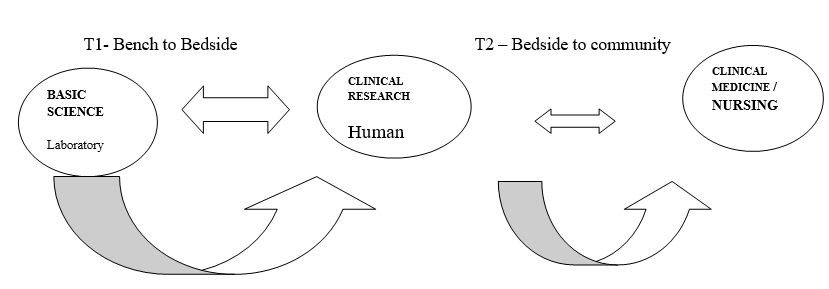The meaning of the word "translational" (which comes from the Latin for "carrying over") refers to the "translation" of fundamental scientific discoveries made in a laboratory setting into viable remedies for disease.
Nursing translational research aims to provide more pertinent, useful findings that directly improve human health.1, 2 With the long term goal of enhancing public health, translational research promotes the mu tidirectional integration of basic research, patient focused research, and population-based research. A two-way process involving the multidisciplinary integration of population based, basic, clinical, practise, and policy-based nursing research. Translational research seeks to swiftly translate scientific knowledge for the benefit of patients and society. Therapeutics, medical equipment, tools, nursing care for disease diagnosis, and avenues for community engagement research are the focus of translational research.
Translational Research Stages
Development, testing, institutionalisation, and evaluation are the first three stages.
Translational research phases
T0: Preclinical and animal investigations in basic science
T1 - Translation to Human
T2 - Translation to patient - Controlled research that results in quality healthcare
T3: Community Translation; Genuine Social Benefit
Although the concept of translational research in healthcare is well-known, nurse-led translational research is a new field of multidisciplinary nursing research.3, 4, 5, 6
Transdisciplinary Research in Nursing Practises: Nature
Nurse scientists may conduct interdisciplinary, transdisciplinary, or multidisciplinary nursing translational research. can work together with any scientist from any field to get the results they want.
Multidisciplinary
Scientists from many disciplines and backgrounds work together to perform research, and the chief investigator is a nurse scientist.7, 8
Area of Nursing Translational Research
Numerous nursing specialties, such as palliative care, infectious disease control and prevention, non-communicable disease prevention, geriatric and paediatric nursing, cardiovascular nursing, population-based challenges in community health nursing, and many others, require translational research in nursing. Nursing professionals can take part in interdisciplinary research projects with translational designs. In their research careers, nurses can advance from research nurses to transdisciplinary nurse scientists. They can receive scholarships if they take part in cross-disciplinary research projects. The first step on the road to this career advancement is becoming a Research Nurse, which requires a minimum B.Sc. in nursing, and leads to becoming a Nurse Scientist, which requires a PhD and post-doctoral degree. Building a bridge to connect the research laboratory is the plan.9, 10, 11

